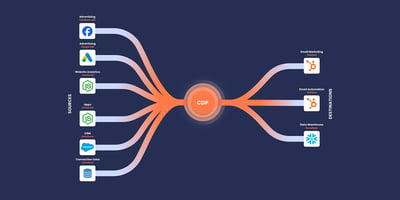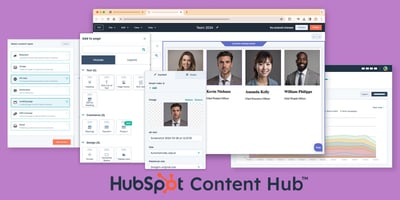It's no secret that Customer Relationship Management systems have become crucial to modern businesses. The system is incredibly powerful, especially when it's used to its full potential. But, what about the potential drawbacks to using a CRM in your business? Are there any to consider?
Here are the five disadvantages of CRMs:
- Difficult implementation process
- Costs of CRMs
- Training your staff
- Complexity of the system
- Data security concerns
Whether you're ready to get started with your CRM, or if you're still evaluating it, you need to be aware of the obstacles that you might face when using a CRM.
Let's take a closer look at the potential disadvantages you might face with a CRM.
The five disadvantages of using a CRM
1. Difficult implementation process
Whichever CRM you choose, you 'could' face a complex and challenging implementation process. At MO Agency we've completed over 150 successful CRM implementations, and it takes time and effort to get them right! Every CRM is a complex system that needs to be integrated properly if you want to make the most of them.
Did you know that almost 70% of CRM integrations fail? That's because most companies try to take on the task by themselves without input from experienced experts. There's a lot of behind the scenes work that goes into the successful implementation of a CRM.
If you've had a bad experience with a CRM, you can easily be put off the idea of using a CRM in the future. That's why it's so important not to take any shortcuts when it comes to the implementation process of your CRM.
2. Costs of CRMs
It goes without saying that if you want a top-quality CRM you need to invest some money. But, the problem is that CRMs can be incredibly expensive, especially when you look at the top CRMs such as Salesforce and Pipedrive.
This often puts smaller, and even medium-sized businesses off the idea of using a CRM. However, a CRM would truly benefit these businesses, if only it wasn't for the costs involved. That's why HubSpot is often the best solution for small and medium businesses that can't afford to invest in the massive CRMs that are often used by large multinationals.
HubSpot can be used for free, without any hidden fees or time trials, which makes it ideal for small and medium businesses. Even better though, as you grow, you can use a combination of free and paid licences. The power users get the paid licences and you get maximum ROI from your paid licence investment. HubSpot has flexible packages that allow the CRM to grow along with your business.
3. Training your staff
CRM systems can be hugely beneficial to any business, but the downside of these systems is that they can be difficult to learn and use consistently. Your team members will need to learn how to use the system, and your management needs to fully understand how the system works so they can provide guidance wherever necessary.
Most CRMs have a learning curve, but, as long as you keep resources and training programs readily available for your team, this curve will be easy to overcome. The process of adapting to a new system in the business might cause some headaches, but as long as team members feel that they are supported and have a point of contact when they run into trouble, the process can be made much easier.
We can show you how to easily incentivise your team to consistently use the CRM.
4. Complexity of the system
One of the biggest concerns that business owners have is that the system is too complex for their team. Some CRMs fall into this category very often. Salesforce CRM is often over spec'ed and can fall in here. Large Salesforce implementations can often require an entire team to look after the CRM. This adds major costs and additional staff members to your team that you didn't account for initially.
Additionally, you may worry that your business processes are too complex to build into a CRM system. While this can sometimes be the case, it generally isn't. Some CRM providers will claim unnecessary complexity to push the boat out on licence fees.
We recently did a Proof of Concept for a large recruitment company. They're were paying Salesforce CRM $6500 p/m for a 'complex' CRM solution. We told them we can provide all their current functionality and more with HubSpot CRM for a fraction of the price at $1800 p/m using a combination of free and paid HubSpot licences. Reluctantly paid us around $5000 for the POC, but we proved the new solution was better and their usage wasn't that complicated. Three year licence savings were $169k! And their 100 person team is much happier with an easier to use CRM.
You may also find that some of your existing team members are resistant to CRMs because of their assumed complexity. It's normal for people to be unsure of a new system when it's being implemented. However, the best way to win them over is to show them how the CRM will benefit their working space and day-to-day tasks.
The majority of these problems can be solved as long as there is a clear line of communication between the team members and management. As long as the management team has sufficient knowledge and training in the new CRM, they can provide some guidance for any team members with concerns.
5. Data security concerns
CRMs provide businesses with one unified system. This means that your business data is shared across team members in the organisation. Whether it's finances, contact details, projects, or marketing analytics, you need to be comfortable sharing these details with some of your teams.
Having all of this data available to your entire team is great when it comes to streamlining your workplace and increasing productivity, but it also means that the data could be at risk of being leaked outside of your business.
As long as your CRM is set up correctly and the correct admin privileges are provided your data is actually safer in a good CRM system. With the correct measures in place, you can enjoy all the benefits of having a CRM running your business without worrying about where your data might be going.
Final Words
We might always be talking about how great CRMs are, but the reality is that there are two sides to every story. As Spiderman's uncle Ben advised Peter Parker (Spiderman:) 'With great power comes great responsibility.'
Along with the benefits that you get, you also need to consider the drawbacks and obstacles that your business might face when implementing a CRM into your business. In the majority of cases though, the benefits significantly outweigh the drawbacks!





